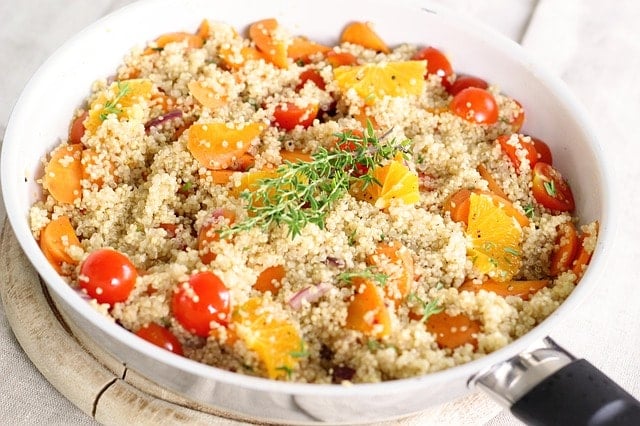Introduction
Quinoa (pronounced keen-wah) is a grain-like food that originated in the Andes Mountain countries of South America, where indigenous groups have used it for more than 7,000 years. Quinoa has enjoyed a surge in popularity over the past few decades, when its exceptional nutritional profile became more widely recognized around the world.
There is no doubt that quinoa is a healthful food. Still, some health blogs and articles tout extraordinary claims that quinoa might be the answer to everything form preventing diabetes to losing weight to curbing inflammation in the body. Let’s delve further into some of these claims and find out what adding more quinoa to your diet can and cannot do for your health.
What Is Quinoa?
Quinoa is often discussed in the category of “whole grains” or referred to as a “pseudocereal” (false cereal). And though it is actually the seed of the plant Chenopodium quinoa Willd, quinoa is similar to whole grains in many ways. For example, like most whole grains, quinoa is a good source of dietary fiber.
Like grains, it is found in hundreds of products, from cereals to crackers, chips to snack bars to pasta. Quinoa is also free of gluten, so it is a common ingredient in many gluten-free grain products. Though quinoa has been popular for quite some time, we will likely see more and more products containing it.
My research even revealed a quinoa-based fermented drink, and I recently had a lovely dark chocolate bar with puffed quinoa for crunch.
What - if anything - in Quinoa is so valuable?
Quinoa’s superior nutrition sets it apart from most other grains (we may include quinoa in the grain category for ease of discussion throughout this article). For example, it is extremely rare for a plant food to have all the essential amino acids. (“Essential” in this case means we must get these amino acids in our foods, because our body cannot produce them on its own.) Quinoa joins soy beans as one of the very few plant foods that contain all of the essential amino acids adults need.
While most peoples’ food intake can provide all the essential amino acids through the variety of foods they eat, countries with food shortages where food variety is highly limited may benefit from transitioning to a staple food like quinoa that supplies all essential amino acids in a single food.
Quinoa has more protein than most grains, and is gluten-free, making it a desirable food for those with celiac disease or wheat sensitivities. Being a seed, quinoa has a bit more fat than most other grains, though its fats are considered healthful.

Researchers also have found that quinoa contains vitamin C, many B vitamins, vitamin E, and beta-carotene (a precursor to vitamin A) in higher quantities than other whole grain products.1 Similarly, it has a higher mineral content, including calcium, iron, and potassium, and has lower quantities of phytic acid, a compound than prevents the body from absorbing some of these minerals.1
Quinoa’s popularity is also bolstered by its resilience to all sorts of growing conditions: it can tolerate drought, salinity, high altitudes, and other ecological variations.2 Great nutrition plus flexibility to different climates has prompted a lot of speculation about quinoa’s potential toward alleviating malnutrition around the world.3 In fact, the United Nations’ Food and Agriculture Organization (FAO) named 2013 the International Year of Quinoa to promote the use and research of this seed worldwide.1
Check out these impressive stats proving quinoa’s promise for global nutrition: In 1980, just eight countries were growing quinoa; by 2015, however, 95 countries were growing it,2 and there are now roughly 5,000 quinoa-seed deposits in seed storage banks around the world.1
By the way, this is great news for quinoa eaters out there: quinoa has been notoriously expensive compared to other grains, in large part due to production not keeping up with the boom in demand. Quinoa prices should decrease as worldwide production continues to increase, so start collecting those quinoa recipes now!
Is There Any Research?
There are easily more than a thousand studies concerning quinoa. The high majority, however, are agriculturally focused. Many more look at food science applications, or ways to bring quinoa into the marketplace in various forms.
There are very few clinical trials using quinoa. In other words, there is little direct evidence that eating quinoa provides specific benefits. There is quite a bit more research focused on certain compounds in quinoa and how those have been shown to influence health. Both of these latter two types of research will be examined here.
Does Quinoa Aid in Weight Loss?

Very little research tracks weight change in humans while eating quinoa. In one study, volunteers eating quinoa bars for a month showed a trend toward decreased weight, though the change was not considered statistically significant4. There is more research using rodents.
One research group compared three diets in rats: one group was fed a quinoa-based diet, one a diet rich in amaranth, and one a diet fortified with casein (a dairy protein). Rats fed either the quinoa diet or the amaranth diet ate less than those eating the casein diet.5 Researchers found that the quinoa diet altered the release of a hormone (cholecystokinin, or CCK) that keeps food in the stomach longer. The quinoa diet, however, did not result in less weight gain in rats.
One individual compound in quinoa that has received a lot of attention is 20HE, or 20-hydroxyecdysone. Mice eating a high-fat diet who were given 20HE gained less body fat, though their total weight was unaffected.6 The same researchers also found that 20HE increased metabolism and decreased the amount of dietary fat absorption.7
Bottom line
Research has not proven that eating quinoa promotes weight loss in humans. However, quinoa is a good source of protein and fiber, both of which promote a feeling of fullness, or satiety, which in turn can naturally decrease portion and calorie intake.
In addition, fiber can also decrease fat absorption in humans,8 and as seen above, quinoa specifically had this effect in mice. Quinoa is a healthful food and if you are interested in losing weight, it cannot hurt to replace some grain portions with quinoa, focusing first on replacing more refined grain products.
Does It Help Fight Cancer?

Some websites that dispense health information have suggested that quinoa can prevent cancer due to its saponin content.9 Indeed, saponins have been shown to be anti-carcinogenic.4 Still, other research has found the saponins from quinoa exhibit little anti-cancer activity compared to saponins from other sources.10
In addition, because saponins are bitter, manufacturers “polish” and wash quinoa to remove them and make quinoa taste better, and consumers are generally advised to rinse quinoa as well, to further remove saponins. (Another reason saponins are removed is that they also make quinoa less digestible, 1 and can cause gastrointestinal upset for some.)
Quinoa does contain numerous other healthful compounds that may impede cancer, such as phytosterols11 and specific polysaccharides,12 and in 2017, a compound called lunasin was discovered in quinoa that also exhibits anti-cancer activity.13
Bottom line
It is difficult to conduct research directly examining quinoa’s (or any single food’s) role in cancer suppression, so don’t hold your breath for a bunch of research in this area. However, quinoa contains a wide variety of beneficial vitamins, minerals and other plant compounds, some of which may have anti-cancer properties.
Does It Influence Heart Health?

I found no primary research indicating increased consumption of quinoa decreased incidence of heart disease or heart attacks. Several journal articles discuss quinoa’s ability to lower cholesterol, however, and it is widely accepted that lowering blood cholesterol levels improves cardiovascular health.
Quinoa contains phytosterols, a plant compound similar to the compound cholesterol, which is only found in animal products and which our own bodies also create. Phytosterols have been shown to inhibit cholesterol absorption in the intestines, and may decrease the amount our bodies produce.1 Epidemiological evidence and intervention research has also shown phytosterols to lower cholesterol in humans. 1
A couple of human studies support the role of quinoa in lowering blood cholesterol. One clinical had 22 students aged 18 to 45 eat cereal bars containing quinoa for 30 days. At the end of the study period, volunteers had significant decreases in triglycerides, total cholesterol, and LDL (the “bad”) cholesterol.1
Another trial containing 35 post-menopausal overweight women found that those who ate quinoa flakes cereal daily for four weeks had decreased total cholesterol and LDL cholesterol compared to women who ate corn flakes instead.14 (The quinoa-eating group also had increased levels of glutathione, a beneficial antioxidant.) Similar decreases in cholesterol have been discovered in rodent studies using quinoa.5
In addition to the effect of phytosterols, fiber can also decrease can help reduce cholesterol,8 and quinoa is a good source of fiber.
As a seed, quinoa has a bit more fat than other “grain” products, about 3.5 grams of fat per cup of cooked quinoa. Quinoa’s fats are considered healthful, and include linoleic and linolenic. These fats and their metabolites (what the body turns them into) also have been linked to improved cardiovascular health.1
As mentioned above, quinoa contains many beneficial nutrients and compounds, including quercetin,15 polyphenols, potassium, and magnesium, which have been discussed in relation to heart-healthy properties such as lowered blood pressure.
Bottom line
There is no direct evidence that quinoa improves heart health. Yet, quinoa contains important and healthful compounds that may improve cholesterol and otherwise contribute to health.
Does it Support Bone Health?

I could not find any research directly linking quinoa to bone health, bone density, or osteoporosis. Quinoa does contain several nutrients important in bone health, however. These include calcium, magnesium, phosphorus, and protein, in amounts higher than other grains.4
It has been reported that those with celiac disease are more likely to be deficient in calcium,16 and quinoa is a gluten-free grain with higher calcium content than other grains, so it may help this population achieve their required calcium intake.
Bottom line
There is no concrete evidence that quinoa intake improves bone health.
Does it reduce diabetes risk?

Again, there is little human research on the anti-diabetic potential of quinoa. One study comparing 12 volunteers with diabetes and 12 volunteers without diabetes discovered positive results in blood sugar control when they compared a quinoa breakfast against a white bread breakfast that were equal in carbohydrate, fat, and protein content.17
When measured four hours after eating, the participants eating the quinoa breakfast experienced fasting blood sugar levels lower than those before breakfast. More notably, they then had less of a glucose response to a high glycemic-index lunch, so the effects were noted further into the day. This is a small sample size and deserves replication.
In rats, too, a quinoa-fortified diet decreased blood sugar levels compared to those without quinoa supplementation.1 Similarly, when obese, hyperglycemic mice were given a supplement made by leaching nutrients from quinoa seeds, their fasting blood sugar dropped.18 In fact, this quinoa leachate supplement performed as well as Metformin, a common medication for diabetes and prediabetes. Another three-week study using mice also showed lowered insulin resistance after 20HE.6
Still, in a study mentioned above, rats fed quinoa did not have lower postprandial (after eating) glucose levels than those fed casein,5 and the same was noted in human subjects above (though benefits were seen after a longer duration).17 Quinoa has been reported both to have a low-glycemic index1 and to have a high glycemic index.17
Quinoa does have fructose and glucose levels comparatively lower than starches in other grains.1 It also has more than 10% of recommended daily fiber per serving, and fiber has been shown to improve the response of insulin after eating8. And, the essential fatty acids in quinoa are types than have been linked to improved insulin sensitivity 1 (meaning that insulin is better able to get glucose out of the blood stream and into cells).
Bottom line
We cannot say that quinoa reduces the risk of diabetes. However, it appears quinoa could have some positive impacts on blood sugar. If you have diabetes, why not bust out your glucometer and do your own experiment?
Does it Decrease Inflammation?

Among other contributors, bodily inflammation is caused by oxidation in the body. Thus, antioxidants help curb inflammation.19 Quinoa contains many nutrients and compounds that may be anti-inflammatory, though few direct studies indicate quinoa’s direct role in fighting inflammation.
Some research noted the anti-inflammatory effect of saponins,{Navruz-Varli, 2016 #26} which, as we have seen, are primarily removed from quinoa for palatability and digestion. A study discussed above also found increased levels of glutathione, a beneficial antioxidant, in women eating quinoa cereal for four weeks compared to a control group eating corn flakes.{De Carvalho, 2014 #27}
Phytoecdysterols and phytosterols, other compounds found in quinoa, have also been reported to have anti-inflammatory properties{Ryan, 2007 #38;Lafont, 2003 #44} as have a polysaccharide isolated from quinoa,{Hu, 2017 #39} and lunasin, discussed above.{Ren, 2017 #41} Quinoa is an excellent source of vitamin E,{Navruz-Varli, 2016 #26} which is also an important antioxidant.
Fiber has also been shown to decrease inflammation in the digestive tract,{Brownawell, 2012 #24} and again, quinoa is a good source of fiber. The types of fats in quinoa - linoleic and linolenic acids, which are precursors to the now-acclaimed DHA and EPA - have been linked to lower inflammation.{Graf, 2015 #3}
Bottom line
We cannot prove that quinoa definitively lowers inflammation in the body. Again, however, it does contain numerous nutrients and phyto (plant) chemicals that may have anti-inflammatory effects.
Is Quinoa Safe?
Quinoa is safe for nearly everyone. The only exception is the very few reported cases of severe allergic reactions to quinoa. Some people may have trouble digesting quinoa if it has not been rinsed well, due to the saponins that coat the seeds. Wash thoroughly, or even soak overnight in the fridge, to see if that alleviates stomach upset. If not, quinoa may not be for you.
Conclusion
As you’ve just read, many of the health promises attributed to quinoa are based on isolated nutrients. This is a common fallacy of reporting research: just because A contains B and B does C, does not mean that A does C. For example, spinach is “a good source of iron,” right? Many leafy greens contain a good amount of iron, but some also contains considerable amounts of oxylates that bind iron, making much of it unavailable to you.
We eat food, we do not eat nutrients in isolation (except as supplements, perhaps). And foods are a complex matrix of all sorts of stuff, some of it working even better for us when provided together (iron and vitamin C) while others might cancel each other out.
That said, quinoa has oodles of healthful compounds in it, so you are likely to reap some health benefits by replacing some of your current grain intake with this powerful little seed, even if they are not obvious to the naked eye. To your good health!

Leave a Reply